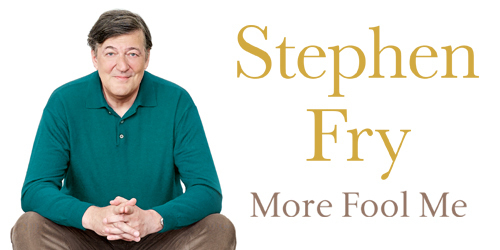Stephen Fry's Blog, page 3
August 19, 2014
DESIGN A POSTER FOR “MORE FOOL ME” LIVE SHOW
Stephen Fry is inviting artists, designers and illustrators from around the world to create a poster that represents the essence of “Stephen Fry”, to coincide with the launch of his new book and live shows in September.
Stephen’s publisher, Penguin Books and Talenthouse, the global online creative community have launched this collaboration and invited the world to get involved.
The poster contest coincides with the release of Stephen’s new memoir, More Fool Me, and a run of five exclusive “Stephen Fry: Live!” shows across the UK in September and October.
The last event will take place at London’s iconic Royal Festival Hall and be streamed live to cinemas around the UK and internationally.
The creative community is being encouraged to submit a poster design capturing the Stephen that the public know and love, as well as hinting at the Stephen they are yet to uncover in the book.
The winning poster judged by Penguin Books and Stephen will become the official poster for the live shows and will be displayed at the venues.
Creatives have until Monday 1 September, 5pm GMT to submit their poster designs here.
Launched beginning August, submission period will end on the 1st September
Voting Starts: September 1, 2014 at 10:00 AM
Voting Ends: September 8, 2014 at 10:00 AM
Winner Announcement: September 15, 2014
July 2, 2014
MORE FOOL ME – AVAILABLE SEPTEMBER 25th
June 10, 2014
Guest blogger, James Rhodes, Pianist

Going beneath the shiny allure of another new iThing, I have mixed feelings about technology. There is the brain-melting awe of knowing that third-world eye examinations can be done remotely, cheaply and quickly using a simple phone camera and saving countless thousands from blindness. The pride at vital social changes that take place as a direct result of Twitter campaigns. The relief at missing children found through Facebook shares (in my case actually finding a perpetrator of child abuse via Facebook which led to him being arrested and charged). The economic and creative boost brought about by Kickstarter. The immense good that comes from JustGiving and present-day saints like Stephen Sutton. Used correctly, tech in 2014 offers company, comfort, truth, independence, companionship and convenience in an increasingly complex, time-pressured and sometimes lonely world.
There is, however, the inevitable flip side – the bullying, misogyny, child abuse, intimidation and hatred that is so effortlessly and easily spread at the click of a button.
As ever, it is the people and not the technology that is responsible for using that technology in the service of good or ill, and whilst that has echoes of the slightly ridiculous ‘guns don’t kill people, people kill people’ tenet of NRA nuts throughout America, it remains a valid point.
Never before has technology become so tied in with our society and the development of that society. Its capacity for good is infinite – economically, spiritually, socially, creatively and medicinally. Things are moving forward exponentially, and although there is an inevitable struggle to keep up to date as progress snowballs, with that same progress comes the opportunity to do almost unimaginable good.
We have a chance, now more than ever before, to benefit from such thrilling technological innovation and channel our use of it in a way that is less about consumerism, greed and ego and more about creating change, competing economically on a global stage and coming together. Let’s not waste it.
James Rhodes @JRhodesPianist Official Website Official You Tube Channel
For further information visit www.agreatplacetobe.uk #dotuk
Guest Blogger, Martha Lane Fox, Baroness Lane Fox of Soho
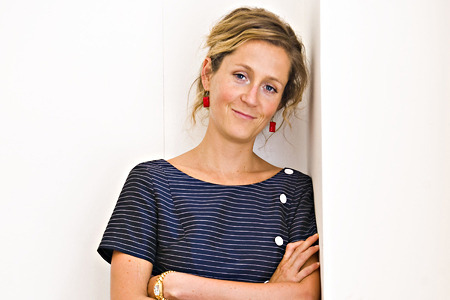
It was only 25 years ago that Tim Berners Lee invented the world wide web. An incredible invention by a british man whose discovery changed the way information, entertainment and business were organised forever. And it seems just as strange to me that as recently as 1998 when Brent Hoberman and I started lastminute.com we spent all our time convincing people the internet wasn’t going to blow up. We would call thousands of hotels and airlines to ask them to give us rooms and seats to sell. How quickly the world has changed.
The UK continues to lead the world in many aspects of the digital revolution. the British are the most advanced online shoppers on the planet (In 2014 e-commerce will account for about 20% of total UK retail) the UK internet sector is bigger than the health or education or construction sectors. Britain has created world-leading businesses – Ssos, Moshi Monsters and, dare I say it, lastminute.com London is becoming a significant tech hub but it is not alone – Edinburgh, Bristol, Brighton are all seeing record numbers of digital start ups.
From September every primary school child will be taught coding, a visionary policy that is the most advanced in the G8.
But despite all of this I fear we are creating a two tier digital country. There are 11 million adults who lack four basic online skills – the ability to communicate, search and share information and to do these things safely. 50% are over 65 but 50% are of working age in a country where 90% of new jobs require basic online skills and many vacancies are only advertised online.
in addition only 30% of small businesses are able to transact online meaning they miss out on both savings and sales. go on uk, the cross sector charity i chair estimates there is £68bn of value to the economy if we address these adult skills. we will need to fill 1m technology sector jobs by 2020 which is looking nearly impossible from our current workforce. the number of women in the uk tech sector is actually falling as an overall percentage and yet the sector is growing in importance – if current trends are not reversed ladygeek estimates only 1% of the sector could be female by 2040.
I am an optimist but we need to keep championing the importance of inclusion and the universality of skills, infrastructure and access otherwise we will never reach our digital potential.
Martha Lane Fox @Marthalanefox Official Website
For further information visit www.agreatplacetobe.uk #dotuk
Three Strokes and You’re Out

It’s only three harmless key-presses, you may think. A year or so back I wrote that it seemed to me annoying and lax of the British internet authority (if such a body ever existed, which it didn’t and doesn’t) when domain names were being handed that they were so inattentive and their eyes so off the ball. How come Germany could have .de, France .fr, South Africa .za, Italy .it etc etc etc? And we poor British had to have the extra exhaustion of typing .co.uk. Three whole keystrokes. It doesn’t stack up to much when compared to other howling injustices in the world. The length of time poor students and tourists have to queue to get an Abercrombie and Fitch polo shirt for example, but nonetheless it has been a nuisance these twenty years or so. Fret no more, people of Britain. The day of .uk is upon us. And team stephenfry.com — as with all things — is proud to be ahead of the curve, or at least cresting it. stephenfry.uk is launched today with a fanfare and an unfurling of the Union Flag. Bear in mind too that if you have businesses with branches in Berlin and Miami, for example, that you will soon be able to own mycompany.berlin and myccompany.miami and so forth. All these generate new IP numbers which so far show no sign of giving out, despite the billions in use.
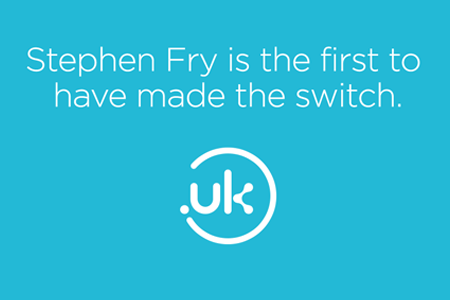
It has been some time since I have rebooted stephenfry.com and offered a 3.0 or a redux as people like to say these days. I’ve been away in New York acting in a play. I returned to start on a book, then to appear in 24 for a fleeting role as Prime Minister, then to embark on a new series of QI. All these rather pressing and time-consuming projects are more or less winding down over the next month or so and I hope to devote a little more time to sprucing up the website and providing more content, gadget reviews and general burblings. In the meantime welcome to stephenfry.uk — and don’t forget to bag your own .uk site if it suits your personality, your business or what Americans call “your gift-giving plans”.
Toodle-pip
x Stephen
For further information visit www.agreatplacetobe.uk #dotuk
January 24, 2014
Mac at 30
It was thirty years ago today that Sergeant Jobs taught the band to play. Sergeant Jobs together with Privates Smith, Atkinson, Kawasaki, Crow, Espinosa and the rest of the Apple Macintosh team, not to mention all those back at Xerox’s Palo Alto Research Center (PARC) and the crew at Stanford who had built the first computer mouse, and back before them, of course, all the geniuses in a line back from Steve Wozniak and Gordon Moore to the original pioneers like Von Neumann and the great Alan Turing.
I like to claim that I bought the second Macintosh computer ever sold in Europe in that January, 30 years ago. My friend and hero Douglas Adams was in the queue ahead of me. For all I know someone somewhere had bought one ten minutes earlier, but these were the first two that the only shop selling them in London had in stock on the 24th January 1984, so I’m sticking to my story.
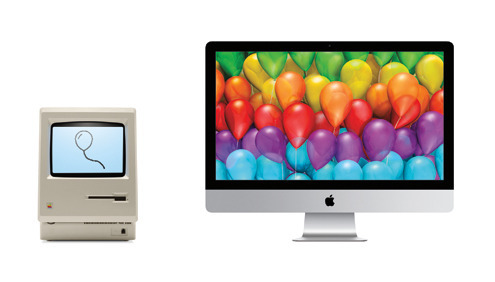
I didn’t see Ridley Scott’s legendary Macintosh commercial until it crept onto English television screens way past its dramatic Superbowl debut, but it has become as much a part of the story of Macintosh’s arrival as the subsequent sacking of Steve Jobs by Apple President John Sculley, the man Jobs had brought in to put Apple into the kind of fighting shape that could make it go head to head with the great enemy: Big Blue, IBM. Steve Jobs saw many things but he did not see that it was the business manoeuvrings and manipulations of Bill Gates in buying for $50,000 an operating system called QDOS that would outsmart Apple and IBM and see Microsoft take over the 80s and 90s as the great giant and cause Bill Gates and his MS partner Paul Allen to be rated the richest men in the world. IBM isn’t even in the PC business anymore. They sold that out to the Chinese company Levono. That was how complete Gates’s victory was.
QDOS (Quick and Dirty Operating System) was renamed by Gates MSDOS (Microsoft Disc Operating System) and he licensed it to IBM who sorely needed a new OS, for its original operating system CP/M and its creator had, not to put too fine a point on it, cracked. Crucially, Gates insisted that he could licence his MSDOS not just to IBM but to other computer manufacturers and plumb spang into that trap IBM fell. They had thought the money was in the box, not in the OS.
The Macintosh on the other hand was a revolution. Yes, it took the best bits of many people’s other ideas, just as the Model T Ford and Spitfire did, but it was the first home consumer or small office computer with a graphical user interface or GUI and that had to be the way forward, unless you were a cretin. Your screen was a white representation of a virtual desk, office icons and wastepaper basket (or trashcan if you prefer) included. There were folders, windows, pull down menus, all of which could be operated and manipulated, not by keyboard commands but by this mystical magical mouse, a rolling pointing clicking device that completely altered the way you related to everything you did on your computer.
The first Macintosh had a monochrome display, the footprint of an A4 piece of paper, offered 128K of RAM and a single disk slot, a new kind of a square stiff disk, not like the black cardboard floppies still being used in IBM and the new wave of IBM compatible machines that were exploiting Gates’s licensing deal with IBM and running MSDOS on their machines, which whether IBM or not, relied on a phosphorous glow of green or orange text and the keyboard for inputting instructions.
The difference was astounding, and the refusal of corporate Systems Analysts to see that Macintosh was the way forward absolutely baffled me. I wasn’t married to Steve Jobs. I had no shares in Apple. I just couldn’t understand why people would sweat away at an ugly, inefficient, head-ache inducing monster like an ICM PC when they could be writing books, publishing them even (by the end of the year the Apple LaserPrinter came out opening up the world of Desk Top Publishing) and enjoying it. Yes, having fun and working at the same time.But it was not to be, we were sneered at, derided, told our devices were toys for people with too much money and not enough business sense. WIMPs (Windows, Icons, Menus, Pointers) PC users gleefully told me over the years, were for wimps.
Eventually, years later Microsoft managed to come up with a new operating system called Windows, that copied everything the Mac did, only badly. Steve Jobs, whom I had the privilege of knowing, always said, and he meant it, that he had nothing but the hugest respect for Bill Gates’s business acumen, and nothing but the profoundest contempt for his taste.
From the very first the Apple Macintosh team included archeologists, classicists, and, famously, Steve’s passion for the print art of fonts was built into the very first Mac and was alone enough to make one fall entirely in love with the device. Steve liked to say that his vision for computing and other devices was a meeting of technology, science and what Americans call the liberal arts. In other words, function, innovation and aesthetic were equal. No other company had such a view. No other company had such a leader.

But, as I said, he was fired in 1985 just a year after leading the Macintosh into the marketplace. He didn’t keep still. He established NeXT computing, founded on his firm belief that the future wave of computing would mean networking, and he saw the multi-tasking, multi-user UNIX operating system as the means to the end of creating devices that could really communicate.
In one of the world’s most extraordinary missed meetings in industrial, commercial or any other kind of human history, a Henry Morton Stanley failed to encounter a Dr Livingston in the most dramatic and comical fashion.
In the early 90s a young British computer scientist, Tim Berners-Lee had been tasked by CERN (Centre Européeen pour la Recherche Nucléaire the now famous large hardon collider that found the Higgs Boson or a tiny thing pretending to be it) to go in and see if he could find a way of getting the Tower of Babel of different computing platforms used by the hundreds of physicists at the plant to talk to each other. He came up with something that made use of metatextual techniques that he called The Information Mine. Being a very very modest man he realised that those initials spelled out his name, TIM, so he changed it at the last minute to the World Wide Web. He wrote a language HTML (Hypertext Markup Language), a set of communication protocols (chiefly htttp — the hypertext transfer protocol) and an application, as we would now say, on which all these could run, which he called a browser.
He planned, devised, programmed and completed this most revolutionary code in Geneva on one of Steve Jobs’s black cube NeXT computers. Hugging his close to him he took the train to Paris where Jobs was going to be present at a NeXT developers’ conference. Clutching the optical disc that contained the most important computer code in history he sat at a desk while Steve marched up and down looking at hopeful programs and applications. As in all of Steve’s judgments they either sucked or were insanely great. Like a Duchess inspecting a flower show he continued along the rows sniffing and frowning until he got two away from the man who had created the code which would change everything, everything in our world. “Sorry Steve, we need to be out of here if we’re going to catch that plane,” whispered an aide into Jobs’s ear. So, with an an encouraging wave Steve left, two footsteps away from being the first man outside CERN to see the World Wide Web. The two men never met and now, since Steve’s death, never can.
The rest of the story is pretty well known. Steve had taken on a group of incredibly talented Computer Graphic Imaging people who had left George Lucas and whom Steve set up as Pixar. By 1997 Apple was collapsing. Inventory was piled high, the share price was on the floor and all my PC friends mocked me to buggery. “Ha! You’re going to have to go to hobby shops to keep your Macs going,” they said. And truth to tell the outlook seemed bleak. As a last throw, Apple bought NeXT bringing in with it of course, its founder and Apple’s original co-founder Steve Jobs. He took a dollar a year as salary, some stock and complete power and authority over the company. Whole projects were closed. Apple went out of the printer making business, out of the camera making business. A young British designer trembled in his office and wrote out his own resignation letter, preparing at least to leave with dignity when he, as so many around him, was inevitably fired.
Sure enough the call came to come to Jobs’s office. “These yours?” Steve asked pointing at some designs of a unibody, transparent blue plastic computer. “Yes,” said the British designer whose name was Jony Ive. “This is the computer we’re going to build and sell this year,” said Jobs. “Nothing else.”
“You do realise that’s how I want it to look?” said Jony. “I mean, the transparent plastic and everything.” “That’s exactly how it’ll look,” Jobs returned. “Only it will have the insanely great things called USB ports too. No other computer in the world has them yet.” The greatest team in commercial computing was born. Perhaps the greatest team in commercial history.
That now iconic Bondi blue computer, christened the iMac, became the best-selling computer of 1998. Next came – you don’t need me to tell you – other colours, and then of course the coloured iBooks, the titanium Powerbook, the iPod, the iPhone and the iPad. From the brink of bankruptcy to becoming the largest and most valuable company on earth Apple had changed the world again, just as it had when the Apple II was the most popular home computer of the 1970s.
The secret was always in Steve’s sense of the aesthetic. People and rivals who thought Apple’s products were a triumph of design over substance just didn’t get it. They get it now of course and fall over themselves to replicate the astounding detailing, bevelling, gleam, glide and sheer beauty of these products. Or of course they hate them and think anyone who uses them is a poser who doesn’t know their tech and has more money than sense.
Apple has split the tech world extraordinarily. If Rory Cellan-Jones, the BBC’s excellent and totally non-partisan technology reporter, is so much as seen as holding an Apple product he will get streams of trolling invective from mad Apple haters. If he holds up a Samsung and licks it, none of us give a toss. It’s all become very troubling. I notice the BBC have no article in their tech page today even mentioning the Mac’s 30th birthday. I supposed they’re just scared by those weird trolls who think that Apple has them in their pay or something equally mad. I can’t be arsed to go out there and defend Apple products, they speak and sell for themselves. If you think the world is fine enough in all other areas for there to be room for you to be all angry about Apple, then go ahead and be angry. It’s your spleen. Do what you like with it.
What cannot be denied is that the first Macintosh changed my life completely. It made me want to write, I couldn’t wait to get to it every morning. If you compare computers to offices, the Mac was the equivalent of the most beautifully designed colourful space, with jazzy carpets on shiny oak floors, a pool table, wooden beams, a cappuccino machine, posters and great music playing. The rest of the world trudged into Microsoft’s operating system: a grey, soulless partitioned office, with nylon carpets, flickering fluorescent lamps and a faintly damp smell. I made that architectural design analogy time after time and no one seemed to notice, thought I was just pretentious. But now of course, MS are as aware of sick building/OS syndrome as anyone else, and have, since the launch of iPad and new range of OS X operating systems gone out of their way to tread the true path to deliciousness, colour, feel, joy, pleasure and taste without which function cannot … well … function.
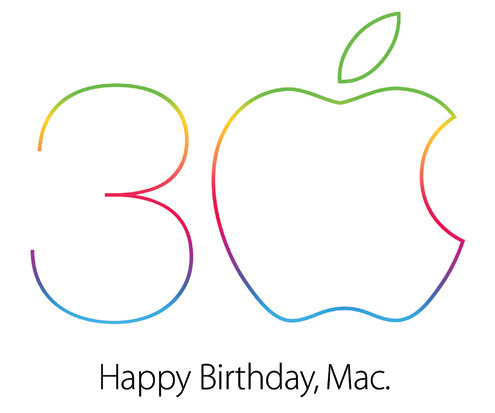
I wish no ill on any other manufacturer of computers or digital devices. But I think it would be an odd, ornery and wrong-headed poltroon who didn’t agree that it is worth recognising the 30th anniversary of a machine that changed everything in our lives.
Sx
August 6, 2013
An Open Letter to David Cameron and the IOC
Dear Prime Minister, M Rogge, Lord Coe and Members of the International Olympic Committee,
I write in the earnest hope that all those with a love of sport and the Olympic spirit will consider the stain on the Five Rings that occurred when the 1936 Berlin Olympics proceeded under the exultant aegis of a tyrant who had passed into law, two years earlier, an act which singled out for special persecution a minority whose only crime was the accident of their birth. In his case he banned Jews from academic tenure or public office, he made sure that the police turned a blind eye to any beatings, thefts or humiliations afflicted on them, he burned and banned books written by them. He claimed they “polluted” the purity and tradition of what it was to be German, that they were a threat to the state, to the children and the future of the Reich. He blamed them simultaneously for the mutually exclusive crimes of Communism and for the controlling of international capital and banks. He blamed them for ruining the culture with their liberalism and difference. The Olympic movement at that time paid precisely no attention to this evil and proceeded with the notorious Berlin Olympiad, which provided a stage for a gleeful Führer and only increased his status at home and abroad. It gave him confidence. All historians are agreed on that. What he did with that confidence we all know.
Putin is eerily repeating this insane crime, only this time against LGBT Russians. Beatings, murders and humiliations are ignored by the police. Any defence or sane discussion of homosexuality is against the law. Any statement, for example, that Tchaikovsky was gay and that his art and life reflects this sexuality and are an inspiration to other gay artists would be punishable by imprisonment. It is simply not enough to say that gay Olympians may or may not be safe in their village. The IOC absolutely must take a firm stance on behalf of the shared humanity it is supposed to represent against the barbaric, fascist law that Putin has pushed through the Duma. Let us not forget that Olympic events used not only to be athletic, they used to include cultural competitions. Let us realise that in fact, sport is cultural. It does not exist in a bubble outside society or politics. The idea that sport and politics don’t connect is worse than disingenuous, worse than stupid. It is wickedly, wilfully wrong. Everyone knows politics interconnects with everything for “politics” is simply the Greek for “to do with the people”.
An absolute ban on the Russian Winter Olympics of 2014 on Sochi is simply essential. Stage them elsewhere in Utah, Lillyhammer, anywhere you like. At all costs Putin cannot be seen to have the approval of the civilised world.
He is making scapegoats of gay people, just as Hitler did Jews. He cannot be allowed to get away with it. I know whereof I speak. I have visited Russia, stood up to the political deputy who introduced the first of these laws, in his city of St Petersburg. I looked into the face of the man and, on camera, tried to reason with him, counter him, make him understand what he was doing. All I saw reflected back at me was what Hannah Arendt called, so memorably, “the banality of evil.” A stupid man, but like so many tyrants, one with an instinct of how to exploit a disaffected people by finding scapegoats. Putin may not be quite as oafish and stupid as Deputy Milonov but his instincts are the same. He may claim that the “values” of Russia are not the “values” of the West, but this is absolutely in opposition to Peter the Great’s philosophy, and against the hopes of millions of Russians, those not in the grip of that toxic mix of shaven headed thuggery and bigoted religion, those who are agonised by the rolling back of democracy and the formation of a new autocracy in the motherland that has suffered so much (and whose music, literature and drama, incidentally I love so passionately).
I am gay. I am a Jew. My mother lost over a dozen of her family to Hitler’s anti-Semitism. Every time in Russia (and it is constantly) a gay teenager is forced into suicide, a lesbian “correctively” raped, gay men and women beaten to death by neo-Nazi thugs while the Russian police stand idly by, the world is diminished and I for one, weep anew at seeing history repeat itself.
“All that is needed for evil to triumph is for good men to do nothing,” so wrote Edmund Burke. Are you, the men and women of the IOC going to be those “good” who allow evil to triumph?
The Summer Olympics of 2012 were one of the most glorious moments of my life and the life of my country. For there to be a Russian Winter Olympics would stain the movement forever and wipe away any of that glory. The Five Rings would finally be forever smeared, besmirched and ruined in the eyes of the civilised world.
I am begging you to resist the pressures of pragmatism, of money, of the oily cowardice of diplomats and to stand up resolutely and proudly for humanity the world over, as your movement is pledged to do. Wave your Olympic flag with pride as we gay men and women wave our Rainbow flag with pride. Be brave enough to live up to the oaths and protocols of your movement, which I remind you of verbatim below.
Rule 4 Cooperate with the competent public or private organisations and authorities in the endeavour to place sport at the service of humanity and thereby to promote peace
Rule 6: Act against any form of discrimination affecting the Olympic Movement
Rule 15 Encourage and support initiatives blending sport with culture and education
I especially appeal to you, Prime Minister, a man for whom I have the utmost respect. As the leader of a party I have for almost all of my life opposed and instinctively disliked, you showed a determined, passionate and clearly honest commitment to LGBT rights and helped push gay marriage through both houses of our parliament in the teeth of vehement opposition from so many of your own side. For that I will always admire you, whatever other differences may lie between us. In the end I believe you know when a thing is wrong or right. Please act on that instinct now.
Yours in desperate hope for humanity
Stephen Fry
June 24, 2013
Only The Lonely
There isn’t any point in denying that the outburst of sympathy and support that followed my confession to an attempt at self-slaughter last year (Richard Herring podcast) has touched me very deeply.
Some people, as some people always will, cannot understand that depression (or in my case cyclothymia, a form of bipolar disorder) is an illness and they are themselves perhaps the sufferers of a malady that one might call either an obsession with money, or a woeful lack of imagination.
“How can someone so well-off, well-known and successful have depression?” they ask. Alastair Campbell in a marvelous article, suggested changing the word “depression” to “cancer” or “diabetes” in order to reveal how, in its own way, sick a question, it is. Ill-natured, ill-informed, ill-willed or just plain ill, it’s hard to say.
But, most people, a surging, warm, caring majority, have been kind. Almost too kind. There’s something a little flustering and embarrassing when a taxi-driver shakes you by the hand, looks deep into your eyes and says “You look after yourself, mate, yes? Promise me?” And there’s something perhaps not too helpful to one’s mental health when it is the only subject people want to talk to you about, however kindly or for whatever reasons.
But I have nothing to complain about. I won’t go into the terrible details of the bottle of vodka, the mixture of pills and the closeness to permanent oblivion I came. You can imagine them and I don’t want to upset the poor TV producer and hotel staff who had to break down my door and find me in the unconscious state I was in, four broken ribs thanks to some sort of convulsive fit that must have overtaken me while I lay almost comatose, vomit dribbling from my mouth. You can picture the scene.
The episode, plus the relationship I now have with a magnificent psychiatrist, has made made my mental health better, I think, than it’s ever been. I used to think it utterly normal that I suffered from “suicidal ideation” on an almost daily basis. In other words, for as long as I can remember, the thought of ending my life came to me frequently and obsessively. But then it’s the thought behind the most famous speech in all history. To be, or not to be.
To be, or not to be: that is the question:
Whether ’tis nobler in the mind to suffer
The slings and arrows of outrageous fortune,
Or to take arms against a sea of troubles,
And by opposing end them? To die: to sleep;
No more; and by a sleep to say we end
The heart-ache and the thousand natural shocks
That flesh is heir to, ’tis a consummation
Devoutly to be wish’d. To die, to sleep;
To sleep: perchance to dream: ay, there’s the rub;
For in that sleep of death what dreams may come
When we have shuffled off this mortal coil,
Must give us pause: there’s the respect
That makes calamity of so long life;
For who would bear the whips and scorns of time,
The oppressor’s wrong, the proud man’s contumely,
The pangs of despised love, the law’s delay,
The insolence of office and the spurns
That patient merit of the unworthy takes,
When he himself might his quietus make
With a bare bodkin? who would fardels bear,
To grunt and sweat under a weary life,
But that the dread of something after death,
The undiscover’d country from whose bourn
No traveller returns, puzzles the will
And makes us rather bear those ills we have
Than fly to others that we know not of?
Thus conscience does make cowards of us all;
And thus the native hue of resolution
Is sicklied o’er with the pale cast of thought,
And enterprises of great pith and moment
With this regard their currents turn awry,
And lose the name of action…
Take time to read it slowly to yourself or out loud. I don’t have Hamlet’s wit (or Shakespeare’s of course) but every logical or doubtful step from line to line expresses better how hard I thought about the advantages and cursed (as I thought) disadvantages against suicide. The speech, for the most part, stayed my hand. As it did Hamlet’s.
But medicine, much as some don’t like to hear it, can help. I am on a regime of four a day. One is an SNRI, the other a mood-stabilizer. I haven’t considered suicide in anything other than a puzzled intellectual way since this pharmaceutical regime “kicked in”.
But I can still be sad. Perhaps you might go to my tumblr page and see what Bertrand Russell wrote about his abiding passions (it’s the last section of the page). I can be sad for the same reason he was, though I do so much less about it than that great man did. But I can be sad for personal reasons because I am often forlorn, unhappy and lonely. These are qualities all humans suffer from and do not qualify (except in their worst extremes) as mental illnesses.
Lonely? I get invitation cards through the post almost every day. I shall be in the Royal Box at Wimbledon and I have serious and generous offers from friends asking me to join them in the South of France, Italy, Sicily, South Africa, British Columbia and America this summer. I have two months to start a book before I go off to Broadway for a run of Twelfth Night there.
I can read back that last sentence and see that, bipolar or not, if I’m under treatment and not actually depressed, what the fuck right do I have to be lonely, unhappy or forlorn? I don’t have the right. But there again I don’t have the right not to have those feelings. Feelings are not something to which one does or does not have rights.
In the end loneliness is the most terrible and contradictory of my problems. I hate having only myself to come home to. If I have a book to write, it’s fine. I’m up so early in the morning that even I pop out for an early supper I am happy to go straight to bed, eager to be up and writing at dawn the next day. But otherwise…
It’s not that I want a sexual partner, a long-term partner, someone to share a bed and a snuggle on the sofa with – although perhaps I do and in the past I have had and it has been joyful. But the fact is I value my privacy too. It’s a lose-lose matter. I don’t want to be alone, but I want to be left alone. Perhaps this is just a form of narcissism, vanity, overdemanding entitlement – give it whatever derogatory term you think it deserves. I don’t know the answer.
I suppose I just don’t like my own company very much. Which is odd, given how many times people very kindly tell me that they’d put me on their ideal dinner party guestlist. I do think I can usually be relied upon to be good company when I’m out and about and sitting round a table chatting, being silly, sharing jokes and stories and bringing shy people out of their shells.
But then I get home and I’m all alone again.
I don’t write this for sympathy. I don’t write it as part as my on going and undying commitment to the cause of mental health charities like Mind. I don’t quite know why I write it. I think I write it because it fascinates me.
And perhaps I am writing this for any of you out there who are lonely too. There’s not much we can do about it. I am luckier than many of you because I am lonely in a crowd of people who are mostly very nice to me and appear to be pleased to meet me. But I want you to know that you are not alone in your being alone.
Loneliness is not much written about (my spell-check wanted me to say that loveliness is not much written about – how wrong that is) but humankind is a social species and maybe it’s something we should think about more than we do. I cannot think of many plays or documentaries or novels about lonely people. Aah, look at them all, Paul McCartney enjoined us in Eleanor Rigby… where do they all come from?
The strange thing is, if you see me in the street and engage in contemplation I will probably freeze into polite fear and smile inanely until I can get away to be on my lonely ownsome.
Make of that what you will.
Sx
June 15, 2013
Stephen Fry's Blog
- Stephen Fry's profile
- 11757 followers


